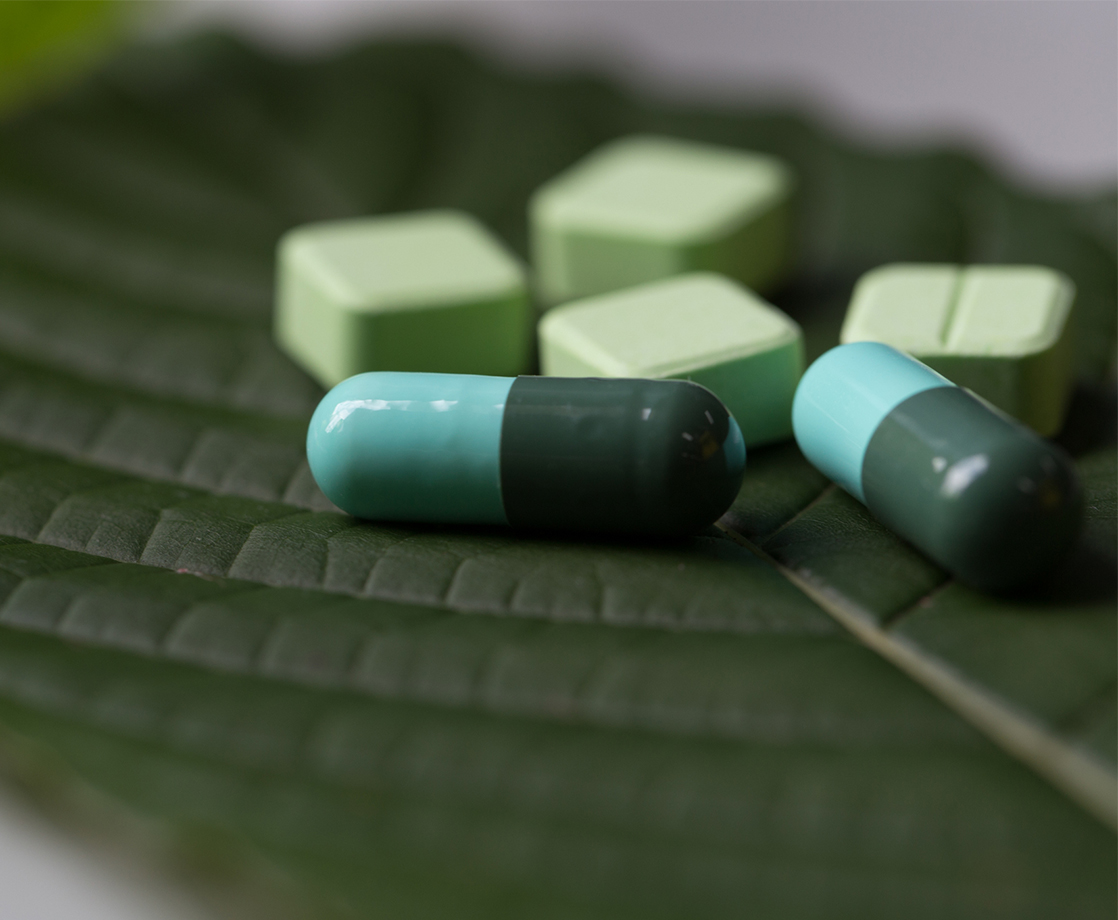While the U.S. is in the thick of an opioid epidemic, an increasing number of Americans have turned to kratom, which users say can provide much-needed relief of opioid withdrawal symptoms. The plant-based supplement, derived from leaves of the kratom tree (Mitragyna speciosa), is also commonly used to relieve chronic pain, depression, and anxiety. Used in Thailand and Malaysia for centuries, kratom has sparked significant controversy in the U.S. and was nearly classified by the DEA as a Schedule I drug in 2016 before those plans were scrapped due to major public outcry.
As public debates about the best ways to combat opioid addiction rates in the U.S. continue, many Americans have sought out alternative remedies for self-treatment of withdrawal and dependency. Kratom is a (currently) legal, widely-available substance with a lower risk of adverse side effects and acute dependency than other treatments, and many users claim it helps them manage their pain while simultaneously easing their reliance on opioids. Others have begun to use it as a milder alternative to prescription antidepressants and other psychiatric medications. As it's grown in popularity, so have concerns about its potential risks.
Still, the FDA and DEA have persisted in painting kratom as potentially risky and even lethal, and media coverage has followed suit, calling the supplement potentially "deadly" and dangerous. A recent systematic review — the most comprehensive review to date on kratom's potential risks — calls those claims into question, however, and provides a blueprint for future research into kratom's clinical benefits and side effects.
Dr. Marc T. Swogger, a clinical psychologist and Associate Professor in the Department of Psychiatry at the University of Rochester Medical Center, and Dr. Zach Walsh, an Associate Professor at the University of British Columbia's Department of Psychology, published their findings in Drug and Alcohol Dependence in February 2018. "We reviewed the literature to date on kratom and mental health, looking at all the studies that had reported on a variety of mental health outcomes," Dr. Walsh told MERRY JANE by phone of his and Dr. Swogger's work. "The main findings were that people are using kratom for a variety of purposes, mostly to help with opioid withdrawal. We also didn't find evidence of kratom increasing negative mental health outcomes."
More specifically, Dr. Walsh clarifies, "It doesn't appear to cause depression, anxiety, or suicidal ideation" — despite some claims that it's driven frequent users to suicide. In fact, their review of over 57 years of available research on kratom suggests that the plant can improve mood and relieve symptoms of mild to moderate anxiety. In other words, the review has profound implications for the future of kratom, which has risked veering quickly into a pattern of public stigmatization and a frenzy of media demonization, not unlike what we've seen with cannabis. Instead, Dr. Swogger told the University of Rochester Medical Center Newsroom, "The bulk of the available research supports kratom's benefits as a milder, less addictive, and less-dangerous substance than opioids, and one that appears far less likely to cause fatal overdose."
The review also indicated that, while kratom does carry some risk of dependence syndrome, its potential for dependency is mild — potentially resulting in symptoms like nausea, irritability, and headaches — compared to that of opioids. This makes sense, says Dr. Walsh, because kratom is from the coffee family, not the opioid family. The mild stimulating, mood-boosting effects many report with kratom may be akin to the kinds of effects we see with coffee. The problem, the study's authors claim, is not kratom itself, but the fact that there's not yet enough empirical work on kratom at all — so the public isn't totally certain about its risks or benefits.

These findings contradict recent claims by the FDA that kratom carries an equal risk of addiction and overdose to opioids. In February 2018, the agency released a new report that left kratom users and experts alike scratching their heads. In it, FDA Commissioner Scott Gottlieb, M.D., emphasized kratom's opioid-like properties, which were determined using predictions made by a computational model. Dr. Gottlieb claimed, "The data from the PHASE model shows us that kratom compounds are predicted to affect the body just like opioids," and thus potentially carry a similar risk of dependence.
Along with the report, the FDA released information on the 36 deaths they'd referenced in a November 2017 press release, along with a public health advisory about the risks of kratom and its potential for addiction and overdose. But the accompanying death reports raised further suspicions about kratom's real risks, rather than alleviating them. In all but one of the 36 deaths cited, Nick Wing writes in the Huffington Post, there are multiple substances listed in the toxicology reports — from Xanax and alcohol to high concentrations of prescription medications. There's only one listed case where mitragynine — the main active ingredient in kratom — is the only substance involved, save for one death that's since been redacted and is listed elsewhere as death by gunshot wound.
According to Dr. Walsh, some of the growing hysteria about kratom might be derived from cultural biases and prejudices. "It's a plant medicine from Southeast Asia, from outside of the North American and Western European pharmaceutical families. So immediately, that arouses suspicion."
Moreover, the treatment of kratom is in line with the historical pattern about how marijuana was painted in the media before being stigmatized and demonized by governmental agencies, politicians, and pharmaceutical companies. "It's hard to speculate on why the War on Drugs would have a component that's harmful to public health," Dr. Walsh says, "but that's been a main theme. It's in keeping with the general dysfunctional madness of the last 75 years of drug policy."
The dubiousness of recent claims by the FDA add to Dr. Walsh's concerns that the risks of kratom are being preemptively overblown. And though the theoretical model described in the recent FDA press release has been one of the agency's "guiding lights" in developing theories about the kratom, Dr. Walsh clarifies that "this model hasn't been empirically validated" and is thus an unreliable source of hard data.
Still, he says, the study shouldn't be taken as proof that kratom isn't harmful. "Lack of evidence doesn't mean an evidence of lack," he warns. Before we can come to any final conclusions about kratom, we'll need to study it further. And since all painkillers have their own negative side effects, it's likely that kratom has some side effects for long-term users. "It's not yet meeting a standard of evidence where it's something that you'd recommend," says Dr. Walsh.
A current salmonella outbreak across several states among kratom users underscores the need for regulation and scientific study of kratom rather than steps towards criminalization or FDA scheduling. Without clearly delineated consumer standards, it's easy for kratom to go underground and risk contamination. But to get to that point, Dr. Walsh and Dr. Swogger argue, it will require large cohort studies that follow kratom users over a period of time, measuring both its harms and medicinal benefits, as well as clinical trials.
Follow Laura Dorwart on Twitter












